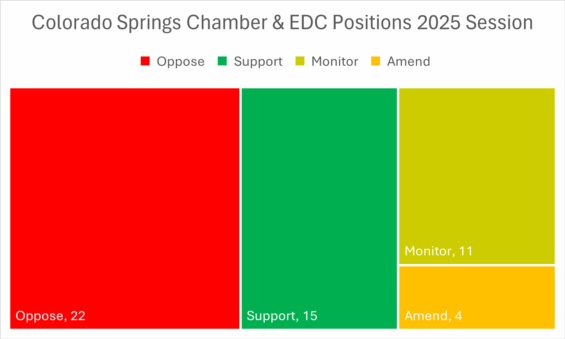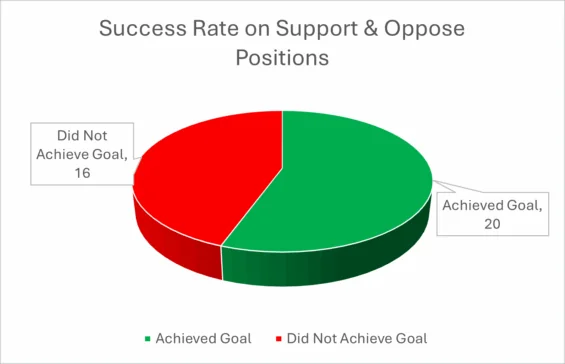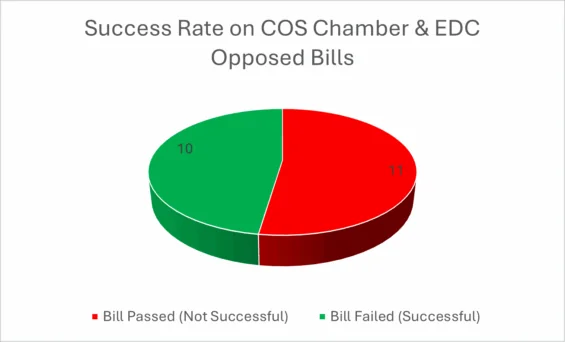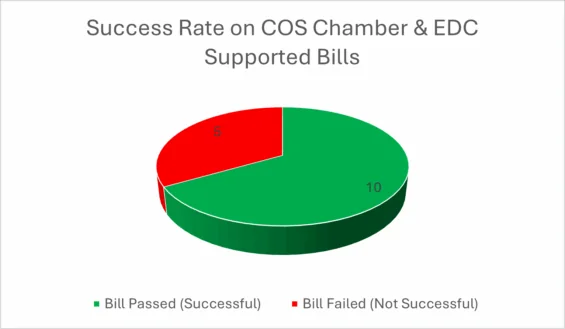
Advocacy
Your Dedicated Pro-Business Advocate
The Colorado Springs Chamber & EDC believes in the power of a collective voice. We work on your behalf to remove barriers to business, saving you money, time, and red-tape headaches. By prioritizing business owner needs, the Chamber & EDC protects our economy and increases resources available to you to grow and thrive in your work.
Our Results
2025 Legislative Session Overview
Prepared by: M.J. Benenati & Joan Andrew Green Turner
The Regular Session of Colorado’s 75th General Assembly adjourned on May 7, following a 120-day period that saw 657 bills introduced—49 fewer than last year—as well as one memorial and 73 resolutions.
Political and Fiscal Landscape
This was the first session in several years where Democrats no longer held a supermajority in the House. With several formerly far-left seats now held by moderates and a handful of Senate resignations triggering vacancies, the Capitol saw a shift toward more pragmatic lawmaking. That shift was bolstered by the reality of a significant budget shortfall. The expiration of COVID-era federal funding and previously enacted fiscal obligations left lawmakers facing a $1.2 billion deficit going into the FY 2025–26 budget cycle.
Every bill this year underwent more scrutiny than usual—not just on policy merit, but also on financial impact. The result: a leaner Long Bill and fewer interim committees. That’s good news for businesses and advocates alike, as it reduces the likelihood of a flood of interim-driven legislation in 2026.
This year the Colorado Springs Chamber & EDC reviewed and took positions on 52 bills.
Those positions being support, oppose, amend, or monitor.

*Data sourced from the Chamber’s official legislation tracker, 17 June 2025
Key Laws
Governor Polis signed a package of labor and liability laws that will reshape the business landscape—most of them despite concerns raised by our community, including:
- HB25-1001: A new wage-theft law that makes business owners potentially liable and expands the state’s authority to pursue claims, even when businesses are acting in good faith.
- HB25-1239: Restores emotional damages in disability lawsuits, with capped fines and a short cure window—but still opens the door to more legal risk.
- HB25-1010: Introduces a price-gouging framework that, while softened from its original form, could still hit sectors like natural gas that operate on national markets.
- SB25-045: Greenlights a taxpayer-funded study on single-payer health care—without public dollars, for now, but with a clear agenda.
Some of these bills were amended to ease the burden—thanks to strong business engagement—but many still represent a significant shift in liability, cost exposure, and compliance risk for employers.
One of the most disappointing losses was HB 1300 – Workers’ Compensation Benefits Proof of Entitlement bill. It was hoped that the Governor would veto the bill, as he had for SB-005, which was a great victory for the Colorado Springs Chamber and for all businesses in Colorado.

*Data sourced from the Chamber & EDC’s official legislation tracker, 17 June 2025

*Data sourced from the Chamber & EDC’s official legislation tracker, 17 June 2025
Key Bills the Chamber & EDC Opposed that Failed
- HB 25-1286: Protecting Workers from Extreme Temperatures
- SB 25-005: Worker Protection Collective Bargaining
- SB 25-157: Deceptive Trade Practice Significant Impact Standard

*Data sourced from the Chamber & EDC’s official legislation tracker, 17 June 2025
Key Bills the Chamber Supported that Passed
- SB 25-299: Consumer Protection Residential Energy Systems
- SB 25-068: Municipal Utility Unclaimed Utility Deposit Program
- HB 25-1021: Tax Incentives for Employee-Owned Businesses
- HB 25-1157: Reauthorize Advanced Industries Tax Credit
Looking Ahead
The lack of interim committees (aside from standing groups such as the Joint Budget Committee and Transportation Legislative Review Committee) means a slower ramp-up to the 2026 session, potentially giving stakeholders like the Chamber & EDC more breathing room for strategic planning and advocacy. Still, with many budget-balancing actions taken this year being temporary, we anticipate an even more difficult fiscal environment next year.
This summer, the Chamber & EDC will be engaging with two key working groups — Workers’ Compensation and Artificial Intelligence — in preparation for next year’s session and to make sure the input of businesses from Southern Colorado is heard.
The Colorado Springs Chamber & EDC remains committed to strong, proactive advocacy on behalf of our business community. As we look ahead to the interim and the 2026 legislative session, we will continue engaging with lawmakers, building coalitions, and championing policies that protect businesses, support workforce development, and strengthen the region’s economic competitiveness.


- Legislative Agenda
- Advocacy Partners

The Chamber & EDC evaluates policies based on the following guiding principles:
- Free markets and competition ensure high service levels, innovation, and competitive pricing.
- Taxes, fees, and regulations must not stifle a thriving economy or pose undue burden on businesses, they should be narrowly focused on strategic and necessary goals, undergo a cost/benefit analysis resulting in a positive ratio, and be easy for businesses to understand and comply with.
- Proactive economic development programs help our community attract, retain, and expand businesses that provide high-quality jobs for our residents. These jobs, in turn, improve quality of life for residents.
2025 Priorities
The Chamber & EDC will focus on Legislation falling broadly into the following categories:
Support Proactive Housing Policy
Support increasing attainable and affordable workforce housing stock regionally and statewide. Housing policy must help the market meet our community’s talent needs and enhance the region’s ability to compete nationally for growth opportunities. Housing policies should remove barriers to construction and incentivize development instead of placing new costs on buyers and renters. Policies should encourage cooperation and partnership between all levels of government, the private and nonprofit entities to bring more units to market for all income levels.
Improve and Protect the Business Regulatory Climate
Work to ensure that job creators are supported with a common sense, stable, and business-friendly regulatory environment. We will contest unnecessary or burdensome regulation that unfairly hinders employers as they work to grow, hire, and thrive in our community. Policies should be built on incentives and allow employers flexibility to implement them in a way that best fits their unique operational environments, rather than on rigid mandates and punitive fine structures. We will press for fair and balanced guidelines where regulation is appropriate, so the business community or specific industries are not unfairly or disproportionately impacted. Regulations must be realistic, effective, efficient, and enforceable.
Ensure Good Governance, Efficiency, and Transparency
Responsive, efficient, effective government provides the infrastructure upon which businesses grow and thrive. We must have transparent and predictable processes for licensing, inspections, and any other government requirement that would affect an employer’s operations. We are vigilant in protecting against inefficient government spending and advancing greater government accountability.
Grow and Diversify our Regional Economy
Proactive and focused economic development efforts are key to raising incomes and providing resilience against future downturns for our region’s workforce. We will support policies that help grow and educate a future-oriented workforce ready to meet the needs of expanding industries. We will support well-considered and specific incentives to help attract new employers in targeted industries to the Pikes Peak Region, ensuring new high-wage jobs.

Many of the issues influencing local business are shared with our regional and state peers. The Chamber & EDC partners with organizations, governments, and coalitions across the state to identify and champion pro-business solutions. Some include:
Colorado Association of Commerce and Industry
Contact Us
Featured News & Media

El Paso County Leads Colorado in Economic Development Projects for Fourth Straight Year

